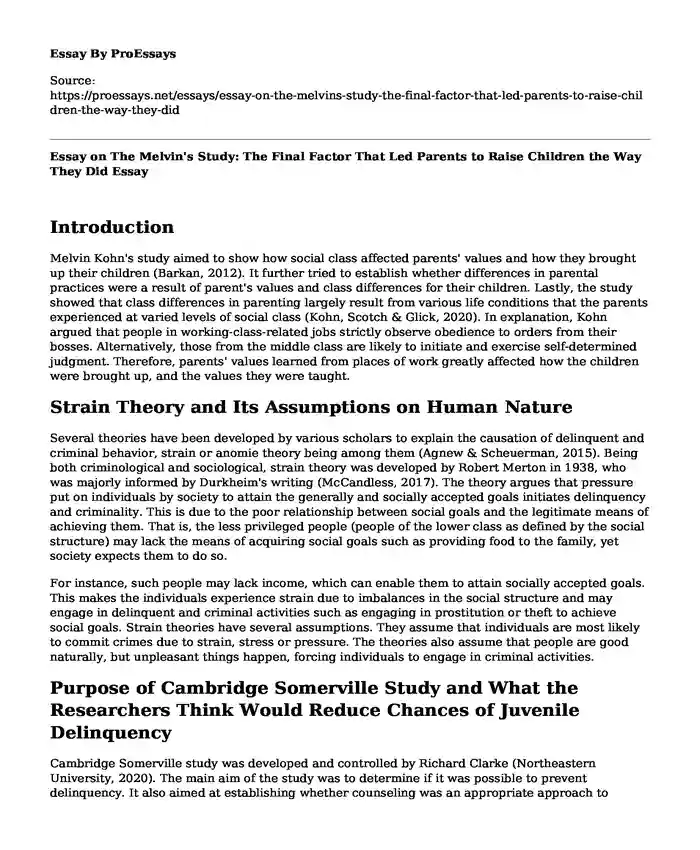Introduction
Melvin Kohn's study aimed to show how social class affected parents' values and how they brought up their children (Barkan, 2012). It further tried to establish whether differences in parental practices were a result of parent's values and class differences for their children. Lastly, the study showed that class differences in parenting largely result from various life conditions that the parents experienced at varied levels of social class (Kohn, Scotch & Glick, 2020). In explanation, Kohn argued that people in working-class-related jobs strictly observe obedience to orders from their bosses. Alternatively, those from the middle class are likely to initiate and exercise self-determined judgment. Therefore, parents' values learned from places of work greatly affected how the children were brought up, and the values they were taught.
Strain Theory and Its Assumptions on Human Nature
Several theories have been developed by various scholars to explain the causation of delinquent and criminal behavior, strain or anomie theory being among them (Agnew & Scheuerman, 2015). Being both criminological and sociological, strain theory was developed by Robert Merton in 1938, who was majorly informed by Durkheim's writing (McCandless, 2017). The theory argues that pressure put on individuals by society to attain the generally and socially accepted goals initiates delinquency and criminality. This is due to the poor relationship between social goals and the legitimate means of achieving them. That is, the less privileged people (people of the lower class as defined by the social structure) may lack the means of acquiring social goals such as providing food to the family, yet society expects them to do so.
For instance, such people may lack income, which can enable them to attain socially accepted goals. This makes the individuals experience strain due to imbalances in the social structure and may engage in delinquent and criminal activities such as engaging in prostitution or theft to achieve social goals. Strain theories have several assumptions. They assume that individuals are most likely to commit crimes due to strain, stress or pressure. The theories also assume that people are good naturally, but unpleasant things happen, forcing individuals to engage in criminal activities.
Purpose of Cambridge Somerville Study and What the Researchers Think Would Reduce Chances of Juvenile Delinquency
Cambridge Somerville study was developed and controlled by Richard Clarke (Northeastern University, 2020). The main aim of the study was to determine if it was possible to prevent delinquency. It also aimed at establishing whether counseling was an appropriate approach to delinquency prevention. The researchers thought that an individualized process of counseling would lower the rate of juvenile delinquency (Tremblay, Welsh & Sayre-McCord, 2019). The counseling process included home-based visits, counselor-juvenile talks, supported participation in Young Men Christian Association and church attendance (Northeastern University 2020). All the activities were thought to initiate change and lower criminality among juveniles positively.
The Most Important Deterrence Factors According to Gibb's Theory of Deterrence
The deterrence theory operates on three major elements- certainty, celerity, and severity (Gibbs, 2020). All these factors appear in incremental steps. The public is made to believe that offenses do not go unpunishable when certainty is made. If made certain, they keep away from crimes in fear of punishment. Celerity plays a rational role by making the public aware of the extent of the punishments' swiftness; hence people are deterred from offending (Gibbs, 2020). Finally, severity (the amount of punishment imposed) hampers people from committing crimes. If the punishment is too severe compared to the benefits gained from committing the crime, people will keep away and avoid a commission.
References
Agnew, R. & Scheuerman, H. (2015). Strain Theories. https://www.oxfordbibliographies.com/view/document/obo-9780195396607/obo-9780195396607-0005.xml
Barkan, S. E. (2012). 11.5 Children and parental discipline. Sociology: Brief Edition. https://2012books.lardbucket.org/books/sociology-brief-edition-v1.1/s14-05-children-and-parental-discipli.html
Gibbs, J. P. (2020). Crime, punishment, and deterrence. https://www.jstor.org/stable/42867909
Kohn, M.L., Scotch, M. A. & Glick, I. D. (2020). The Effects of Social Class on Parental Values and Practices. https://link.springer.com/chapter/10.1007/978-1-4757-9150-1_3
McCandless, C. (2017). Anomie/strain theory. https://us.sagepub.com/sites/default/files/upm-assets/76592_book_item_76592.pdf
Northeastern University. (2020). Methodology. Cambridge-Somerville Youth Study. https://cssh.northeastern.edu/sccj/research/cambridge-somerville-youth-study/
Tremblay, R. E., Welsh, B.C. & Sayre-McCord, G. (2019). Crime and the life-course, prevention, experiments, and truth-seeking: Joan McCord’s pioneering contributions to criminology. https://www.annualreviews.org/doi/abs/10.1146/annurev-criminol-011518-024712?journalCode=criminol
Cite this page
Essay on The Melvin's Study: The Final Factor That Led Parents to Raise Children the Way They Did. (2023, Dec 17). Retrieved from https://proessays.net/essays/essay-on-the-melvins-study-the-final-factor-that-led-parents-to-raise-children-the-way-they-did
If you are the original author of this essay and no longer wish to have it published on the ProEssays website, please click below to request its removal:
- Developmental Stages in Children Essay Example
- Essay Sample on Corporate Social Responsibility and Competitive Advantage
- What is Freedom? - Essay Sample
- Legalization of Same-Sex Marriage Essay Example
- Essay Example on Gaining Knowledge in Campus: Benefits and Challenges
- Essay Sample on Equality: A Controversial Moral Principle in Society
- Free Essay Sample on Old-New Synagogue: Place of Jewish Worship, Study & Community







